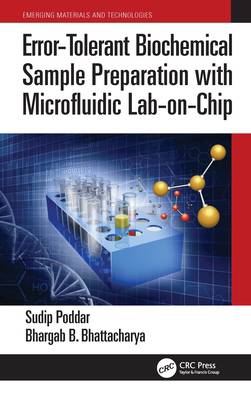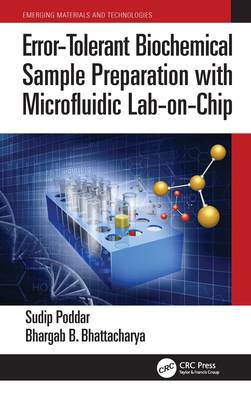
- Retrait gratuit dans votre magasin Club
- 7.000.000 titres dans notre catalogue
- Payer en toute sécurité
- Toujours un magasin près de chez vous
- Retrait gratuit dans votre magasin Club
- 7.000.000 titres dans notre catalogue
- Payer en toute sécurité
- Toujours un magasin près de chez vous
Error-Tolerant Biochemical Sample Preparation with Microfluidic Lab-on-Chip
Sudip Poddar, Bhargab B BhattacharyaDescription
Microfluidic biochips have gained prominence due to their versatile applications to biochemistry and health-care domains such as point-of-care clinical diagnosis of tropical and cardiovascular diseases, cancer, diabetes, toxicity analysis, and for the mitigation of the global HIV crisis, among others. Microfluidic Lab-on-Chips (LoCs) offer a convenient platform for emulating various fluidic operations in an automated fashion. However, because of the inherent uncertainty of fluidic operations, the outcome of biochemical experiments performed on-chip can be erroneous even if the chip is tested a priori and deemed to be defect-free. This book focuses on the issues encountered in reliable sample preparation with digital microfluidic biochips (DMFBs), particularly in an error-prone environment. It presents state-of-the-art error management techniques and underlying algorithmic challenges along with their comparative discussions.
- Describes a comprehensive framework for designing a robust and error-tolerant biomedical system which will help in migrating from cumbersome medical laboratory tasks to small-sized LOC-based systems
- Presents a comparative study on current error-tolerant strategies for robust sample preparation using DMFBs and reports on efficient algorithms for error-tolerant sample dilution using these devices
- Illustrates how algorithmic engineering, cyber-physical tools, and software techniques are helpful in implementing fault tolerance
- Covers the challenges associated with design automation for biochemical sample preparation
- Teaches how to implement biochemical protocols using software-controlled microfluidic biochips
Interdisciplinary in its coverage, this reference is written for practitioners and researchers in biochemical, biomedical, electrical, computer, and mechanical engineering, especially those involved in LOC or bio-MEMS design.
Spécifications
Parties prenantes
- Auteur(s) :
- Editeur:
Contenu
- Nombre de pages :
- 206
- Langue:
- Anglais
- Collection :
Caractéristiques
- EAN:
- 9781032113807
- Date de parution :
- 27-07-22
- Format:
- Livre relié
- Format numérique:
- Genaaid
- Dimensions :
- 156 mm x 234 mm
- Poids :
- 489 g







